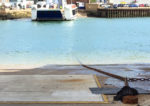The rate of hospital admissions caused by alcohol-related liver disease on the Isle of Wight has rocketed over the last five years.
Liver experts at the Institute of Hepatology said the figures are “horrifying” and called on the Government to set a minimum price per unit of alcohol to discourage drinking.
Going up
The latest data from Public Health England shows that the rate has gone up to 47 patients admitted for every 100,000 people between April 2016 and March 2017 – 87% higher than five years earlier.
That means that 71 people on Isle of Wight were admitted due to this condition in 2016-17.
National comparison
The rate for the whole of England is 39 for every 100,000 people, but it ranges from 127 in Blackburn with Darwen to ten in Sutton.
The data shows that men are twice as likely as women to receive hospital treatment for this illness across the country.
Socioeconomic status a factor
Socioeconomic status is also a factor. The rate of alcohol-related liver disease admissions among the most deprived in society is 57 for every 100,000 people, but is below 29 for the most well off.
A spokesperson for Public Health England said:
“Liver disease is one of the top causes of death in England and people are dying from it at younger ages. Most liver disease is preventable and much is influenced by alcohol consumption and obesity prevalence.”
In 2014, the Lancet Commission on alcohol-related liver diseases estimated that health problems caused by alcohol are costing the NHS £3.5 billion a year.
Alcohol minimum price suggested
Professor Roger Williams, director of the Institute of Hepatology, proposed setting a minimum price per unit of alcohol to curb drinking.
“Liver disease mortality rates have increased about 600% in the last 50 years. That happens because alcohol consumption among the population has increased and this is linked to the fact that the costs of alcoholic drinks proportionally have fallen.
“Setting a minimum alcohol price is a highly effective way of dealing with the problem. In Canada, they had a 14% drop in emergency admissions and 8% drop in mortality in the first 12 months after setting this minimum.”
Scotland adopted this measure in May, setting a 50 pence minimum price per unit of alcohol. The Welsh Government is planning to implement the same lowest price next summer.
Liver disease a silent killer
Judi Rhys, CEO of the British Liver Trust, called on GPs to improve their awareness of the risks. She said:
“Liver disease is a silent killer because there are often no obvious symptoms in the early stages. We know that at the moment three quarters of people are diagnosed in a hospital setting when the condition is quite advanced.
“GPs need to understand how to interpret the results of blood tests and clear pathways need to be commissioned so that they know who to refer and how to refer.
“There has also been an exponential increase in the supply of low price alcohol to the public with a growing range of cheap drink promotions in shops. More people drink at home and more people drink wine and spirits which have a much higher alcohol content.
“A common myth is that you have to be an alcoholic to damage your liver. The term alcoholic is misleading as alcohol dependency is a spectrum and more than one in five people in the UK currently drink alcohol in way that could harm their liver.”
The NHS says alcohol-related liver disease doesn’t usually cause any symptoms until the liver has been severely damaged. When that happens symptoms can include feeling sick, weight loss, loss of appetite and yellowing of the eyes and skin.
Article shared by Data Reporter as part of OnTheWight’s collaboration with Press Association and Urbs Media





